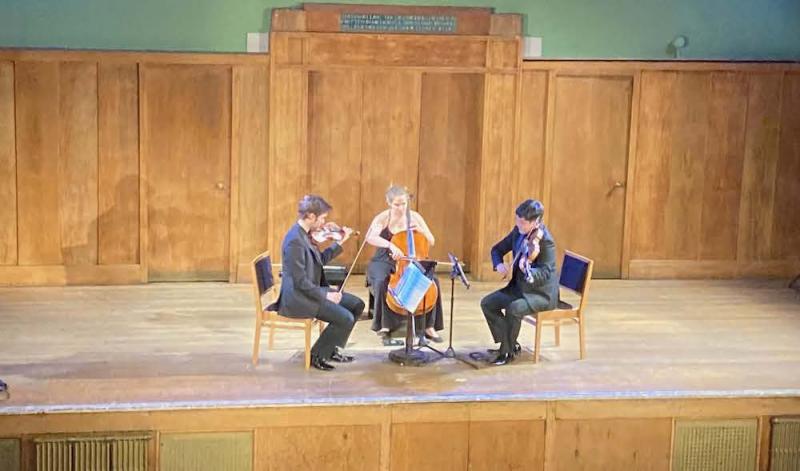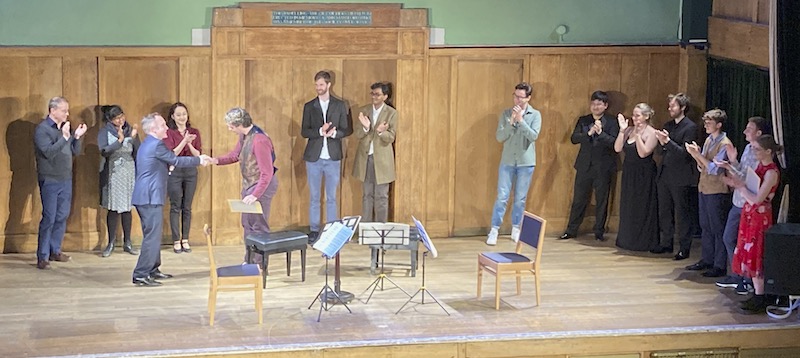Clements Prize, Conway Hall review - newly-written string trios in competition | reviews, news & interviews
Clements Prize, Conway Hall review - newly-written string trios in competition
Clements Prize, Conway Hall review - newly-written string trios in competition
Varied works by young composers get a sympathetic reading

The Conway Hall in London has hosted chamber music concerts since it was built in 1929, and for 40 years this included a composition prize, in abeyance since the late 1970s. This has now been revived by the hall’s enterprising director of music, pianist Simon Callaghan, to help young composers post-pandemic. Sunday night saw the final concert in which the shortlisted pieces were played and the winner announced.
The competition rubric called for new string trios by composers under the age of 35 – the finalists ranged from 19-31 – and they gave a snapshot of the music younger composers are writing. There was a main prize (a generous £3,000) and a voted-for audience prize.
As is usual with reports of this sort, my preferences did not completely align with the judgment of the panel, although I had no quibble as there were no weak pieces, and sufficient variety to make the event work as a concert. The trio, a subset of the Piatti Quartet, were excellent throughout, playing this series of demanding new works with commitment and sympathy. Violist Tetsuumi Nagata in particular shone, with his intense and focused sound.
To take the pieces in their concert order, we started with Alexander Verster’s The Tunemonger. This was my favourite (although no one ever wins a competition from first up), offering a nostalgic reminiscence of British music of the 20th century through a contemporary lens. Alex Groves’s Three Forms was a complete contrast and a boldly minimal statement, its 10 minutes consisting of an expressionless, non-developmental sequence of chords based on open fifths, which shifted and transmuted. It had the purity of a John Luther Adams conception and was arrestingly single-minded. Vivek Haria’s Ennui belonged to an expressionist world with striking unison passages and a contemplative and affecting ending. Noah Max’s Sojourn, the overall winner (pictured above), is a tribute to a deceased compositional mentor, in six short movements. It reminded me of Webern in its compactness, mercurial in character, detailed in its scoring and with echoes of Samuel Barber in its fragile slow movement.
Vivek Haria’s Ennui belonged to an expressionist world with striking unison passages and a contemplative and affecting ending. Noah Max’s Sojourn, the overall winner (pictured above), is a tribute to a deceased compositional mentor, in six short movements. It reminded me of Webern in its compactness, mercurial in character, detailed in its scoring and with echoes of Samuel Barber in its fragile slow movement.
After the interval, Jacob Fitzgerald’s trio erasmus squeezed 10 movements into 13 minutes, a bit of good old-fashioned modern music, with glissandos, harmonics and all the familiar toolbox of effects. It was best in its assertive, even violent passages, although the structure felt diffuse. Emily Pedersen’s Partnership, winner of the audience prize, explored issues of body image through consonances that were gradually soured and a quotation of “Pop goes the weasel” that I didn’t really understand. Last, Dominic Wills’s Indris, had a convincing rhetorical flow but, as with some others, the methods of this young composer felt like the inherited methods of older, once-radical composers. Verster and Groves felt most like the ones forging their own path.
Before the judgment was announced we were treated to Joseph Phibbs’s Quartet No.1, commissioned and performed by the Piatti Quartet. This was an excellent showcase for the quartet, including violinist Rebecca Chan, whose quasi-improvised melodies at the beginning emerged delicately from the supporting chords. It is a mature and considered piece, which, in contrast with some of the competition pieces, felt relaxed in its own skin, doing more with less.
rating
Share this article
The future of Arts Journalism
You can stop theartsdesk.com closing!
We urgently need financing to survive. Our fundraising drive has thus far raised £49,000 but we need to reach £100,000 or we will be forced to close. Please contribute here: https://gofund.me/c3f6033d
And if you can forward this information to anyone who might assist, we’d be grateful.

Subscribe to theartsdesk.com
Thank you for continuing to read our work on theartsdesk.com. For unlimited access to every article in its entirety, including our archive of more than 15,000 pieces, we're asking for £5 per month or £40 per year. We feel it's a very good deal, and hope you do too.
To take a subscription now simply click here.
And if you're looking for that extra gift for a friend or family member, why not treat them to a theartsdesk.com gift subscription?
more Classical music
 Appl, Levickis, Wigmore Hall review - fun to the fore in cabaret and show songs
A relaxed evening of light-hearted fare, with the accordion offering unusual colours
Appl, Levickis, Wigmore Hall review - fun to the fore in cabaret and show songs
A relaxed evening of light-hearted fare, with the accordion offering unusual colours
 Lammermuir Festival 2025, Part 2 review - from the soaringly sublime to the zoologically ridiculous
Bigger than ever, and the quality remains astonishingly high
Lammermuir Festival 2025, Part 2 review - from the soaringly sublime to the zoologically ridiculous
Bigger than ever, and the quality remains astonishingly high
 BBC Proms: Ehnes, Sinfonia of London, Wilson review - aspects of love
Sensuous Ravel, and bittersweet Bernstein, on an amorous evening
BBC Proms: Ehnes, Sinfonia of London, Wilson review - aspects of love
Sensuous Ravel, and bittersweet Bernstein, on an amorous evening
 Presteigne Festival 2025 review - new music is centre stage in the Welsh Marches
Music by 30 living composers, with Eleanor Alberga topping the bill
Presteigne Festival 2025 review - new music is centre stage in the Welsh Marches
Music by 30 living composers, with Eleanor Alberga topping the bill
 Lammermuir Festival 2025 review - music with soul from the heart of East Lothian
Baroque splendour, and chamber-ensemble drama, amid history-haunted lands
Lammermuir Festival 2025 review - music with soul from the heart of East Lothian
Baroque splendour, and chamber-ensemble drama, amid history-haunted lands
 BBC Proms: Steinbacher, RPO, Petrenko / Sternath, BBCSO, Oramo review - double-bill mixed bag
Young pianist shines in Grieg but Bliss’s portentous cantata disappoints
BBC Proms: Steinbacher, RPO, Petrenko / Sternath, BBCSO, Oramo review - double-bill mixed bag
Young pianist shines in Grieg but Bliss’s portentous cantata disappoints
 theartsdesk at the Lahti Sibelius Festival - early epics by the Finnish master in context
Finnish heroes meet their Austro-German counterparts in breathtaking interpretations
theartsdesk at the Lahti Sibelius Festival - early epics by the Finnish master in context
Finnish heroes meet their Austro-German counterparts in breathtaking interpretations
 Classical CDs: Sleigh rides, pancakes and cigars
Two big boxes, plus new music for brass and a pair of clarinet concertos
Classical CDs: Sleigh rides, pancakes and cigars
Two big boxes, plus new music for brass and a pair of clarinet concertos
 Waley-Cohen, Manchester Camerata, Pether, Whitworth Art Gallery, Manchester review - premiere of no ordinary violin concerto
Images of maternal care inspired by Hepworth and played in a gallery setting
Waley-Cohen, Manchester Camerata, Pether, Whitworth Art Gallery, Manchester review - premiere of no ordinary violin concerto
Images of maternal care inspired by Hepworth and played in a gallery setting
 BBC Proms: Barruk, Norwegian Chamber Orchestra, Kuusisto review - vague incantations, precise laments
First-half mix of Sámi songs and string things falters, but Shostakovich scours the soul
BBC Proms: Barruk, Norwegian Chamber Orchestra, Kuusisto review - vague incantations, precise laments
First-half mix of Sámi songs and string things falters, but Shostakovich scours the soul
 BBC Proms: Alexander’s Feast, Irish Baroque Orchestra, Whelan review - rapturous Handel fills the space
Pure joy, with a touch of introspection, from a great ensemble and three superb soloists
BBC Proms: Alexander’s Feast, Irish Baroque Orchestra, Whelan review - rapturous Handel fills the space
Pure joy, with a touch of introspection, from a great ensemble and three superb soloists
 BBC Proms: Moore, LSO, Bancroft review - the freshness of morning wind and brass
English concert band music...and an outlier
BBC Proms: Moore, LSO, Bancroft review - the freshness of morning wind and brass
English concert band music...and an outlier

Add comment